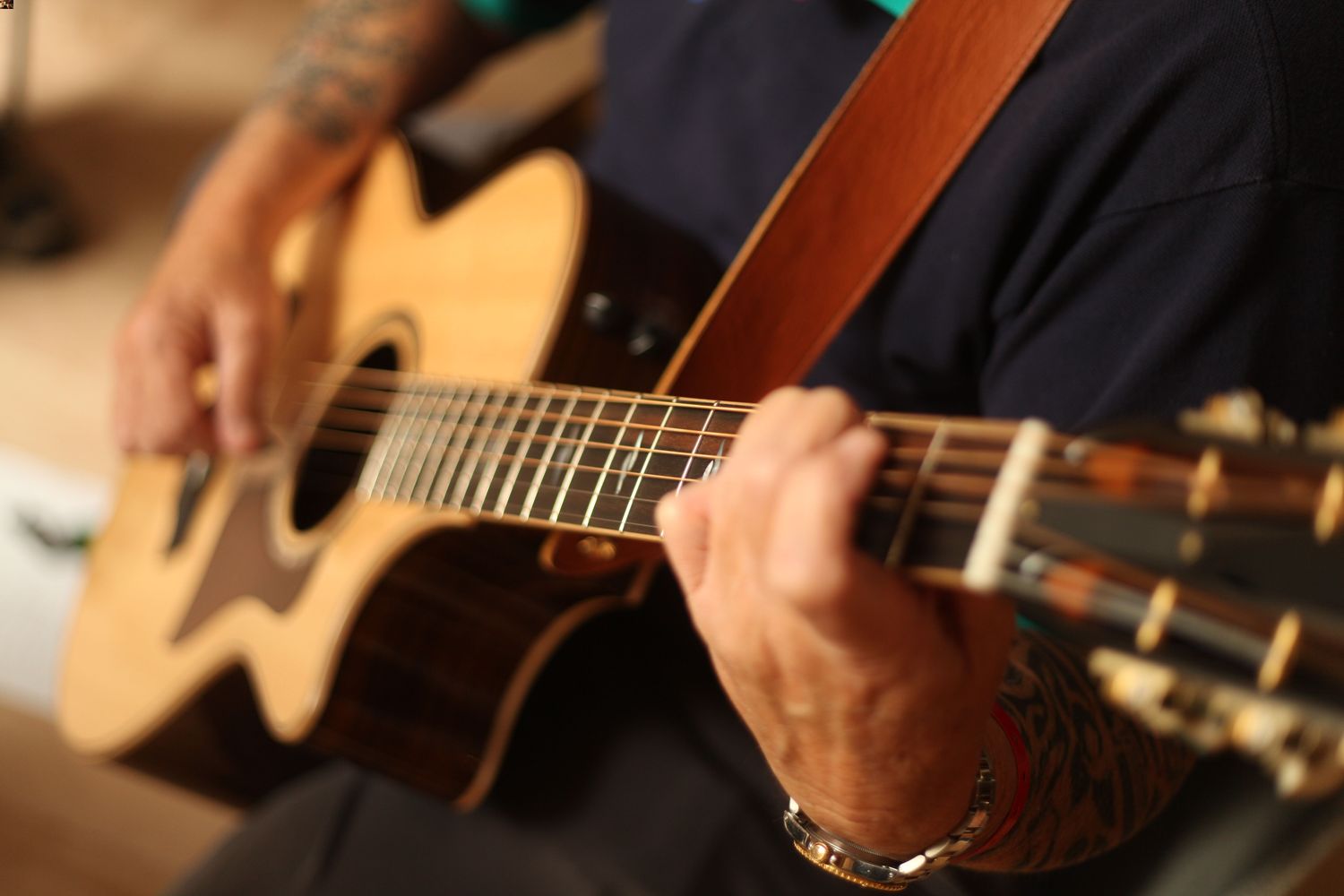Home>Instruments>Guitar>How Long Does It Take To Learn To Play The Guitar


Guitar
How Long Does It Take To Learn To Play The Guitar
Modified: February 16, 2024
Learn to play the guitar in no time! Discover how long it takes to master the guitar and start strumming your favorite tunes. Expert tips and guidance.
(Many of the links in this article redirect to a specific reviewed product. Your purchase of these products through affiliate links helps to generate commission for AudioLover.com, at no extra cost. Learn more)
Table of Contents
Introduction
Learning to play the guitar is an exciting and rewarding journey that opens the door to a world of musical expression. Whether you aspire to strum along to your favorite songs, perform on stage, or even write your own music, mastering the guitar can bring immense joy and fulfillment. However, the question that often arises for beginners is, "How long does it take to learn to play the guitar?"
The answer to this question varies widely, as it depends on several factors, including the individual's dedication, the quality of instruction, and the amount of practice time invested. While there is no definitive timeline for mastering the guitar, understanding the key elements that influence the learning process can provide valuable insight for aspiring musicians.
In this article, we will explore the factors that affect the time it takes to learn to play the guitar, including basic techniques and chords, learning songs and styles, and establishing a practice regimen. By delving into these aspects, aspiring guitarists can gain a clearer understanding of the learning process and set realistic expectations for their musical journey. So, let's embark on this melodious adventure and uncover the secrets to mastering the guitar!
Factors Affecting Learning Time
Several factors play a crucial role in determining the time it takes to learn to play the guitar. One of the primary influences is the individual’s commitment and dedication to practice. Consistent and focused practice sessions are essential for skill development and musical proficiency. Additionally, the quality of instruction and learning resources can significantly impact the learning curve. Access to knowledgeable instructors, comprehensive learning materials, and effective teaching methods can expedite the learning process.
Another influential factor is the student’s prior musical experience. Individuals with a background in music theory or proficiency in other instruments may find it easier to grasp guitar concepts and techniques. On the other hand, complete beginners may require more time to familiarize themselves with fundamental musical principles and develop essential skills.
Furthermore, the complexity of the chosen musical style or genre can affect the learning timeline. While some styles, such as folk or pop, may be relatively accessible to beginners, others, like jazz or classical guitar, demand a more extensive understanding of music theory and advanced techniques. The desired level of proficiency also plays a crucial role. Whether aiming to strum basic chords for personal enjoyment or pursue virtuosic fingerstyle playing, the learning trajectory will vary accordingly.
Moreover, individual learning preferences and aptitude can influence the pace of progress. Some learners thrive in structured environments with clear goals and milestones, while others prefer a more flexible and exploratory approach. Understanding one’s learning style and adapting the learning process to align with personal preferences can enhance motivation and accelerate skill development.
Ultimately, the time it takes to learn to play the guitar is a highly individualized journey, shaped by a combination of dedication, resources, musical background, stylistic preferences, and learning approach. By recognizing these influential factors, aspiring guitarists can navigate their learning path with clarity and purpose, setting realistic expectations while remaining open to the joy of musical discovery.
Basic Techniques and Chords
Mastering basic techniques and chords forms the foundation of guitar playing and significantly impacts the learning timeline. Fundamental techniques, such as fretting notes, strumming, and fingerpicking, are essential skills that aspiring guitarists must develop. These techniques lay the groundwork for executing chords, scales, and melodies with precision and musicality.
Understanding and practicing basic chords are pivotal in the early stages of learning the guitar. Chords are the building blocks of countless songs across various genres, making them indispensable for any aspiring guitarist. Learning to transition smoothly between chords and strumming patterns enhances musical fluency and paves the way for playing a wide range of songs.
Furthermore, familiarizing oneself with essential chord families, such as major, minor, and dominant chords, expands the harmonic vocabulary and enables players to explore diverse musical styles. As beginners progress, they may delve into more complex chord voicings and extended harmonies, broadening their expressive capabilities on the instrument.
Basic techniques and chords not only facilitate the initial stages of learning but also continue to underpin advanced playing. Even seasoned guitarists frequently revisit and refine these foundational elements to maintain dexterity and musical fluency. Therefore, dedicating time to mastering basic techniques and chords is a worthwhile investment that yields long-term benefits in one’s musical journey.
Learning Songs and Styles
Exploring a diverse repertoire of songs and musical styles is a pivotal aspect of learning to play the guitar. Engaging with songs that resonate with the learner’s musical preferences fosters motivation and enjoyment, driving the learning process forward. Whether drawn to the soulful melodies of blues, the rhythmic intricacies of jazz, or the raw energy of rock, aspiring guitarists can immerse themselves in a rich tapestry of musical expression.
Learning songs within one’s preferred styles provides a practical and enjoyable avenue for honing guitar skills. It allows players to internalize chord progressions, develop a sense of rhythm, and cultivate an understanding of song structure. Additionally, dissecting and learning from the playing styles of renowned guitarists within specific genres can offer valuable insights and inspiration.
Moreover, embracing a diverse range of musical styles cultivates versatility and musical adaptability. While mastering the nuances of blues guitar may require a different approach than delving into classical fingerstyle, each stylistic pursuit contributes to the guitarist’s musical fluency and expressive range. This exposure to varied styles nurtures a well-rounded musical sensibility and broadens the guitarist’s creative palette.
Furthermore, delving into different musical styles encourages learners to explore unique playing techniques and theoretical concepts inherent to each genre. From the intricate fingerpicking patterns of folk music to the improvisational language of jazz, each style presents distinct challenges and opportunities for growth, enriching the guitarist’s musical journey.
Ultimately, learning songs and styles on the guitar is a dynamic and enriching process that not only enhances technical proficiency but also nurtures a deep appreciation for the diverse tapestry of musical expression. By immersing oneself in a breadth of musical genres, aspiring guitarists can cultivate a versatile skill set and a profound understanding of the instrument’s boundless potential.
Practice Regimen
Establishing a structured and effective practice regimen is paramount for aspiring guitarists seeking to enhance their skills and musical fluency. A well-crafted practice routine not only accelerates learning but also cultivates discipline and focus, essential attributes for musical growth.
Consistency is key when it comes to practice. Setting aside regular, dedicated time for guitar practice, even if it’s just a few minutes each day, fosters steady progress and skill development. Whether it’s in the morning before the day begins or in the quiet hours of the evening, carving out a consistent practice schedule helps integrate guitar playing into one’s daily routine.
Moreover, structuring practice sessions to encompass a variety of elements, such as technical exercises, chord progressions, scales, and learning new songs, ensures a comprehensive approach to skill development. Balancing the refinement of existing skills with the exploration of new material fosters well-rounded musicianship and prevents monotony in practice.
Setting specific, achievable goals for each practice session provides a clear sense of direction and accomplishment. Whether aiming to master a challenging chord transition, improve fingerpicking dexterity, or memorize a new song, delineating tangible objectives fuels motivation and tracks progress over time.
Additionally, incorporating focused and deliberate practice techniques, such as slow and mindful repetition, targeted problem-solving, and attentive listening, maximizes the efficiency of practice sessions. By honing in on areas that require improvement and employing deliberate strategies to address them, aspiring guitarists can overcome obstacles and refine their playing with precision.
Lastly, maintaining a balance between structured practice and spontaneous musical exploration is crucial for nurturing creativity and musical intuition. Allowing room for improvisation, jamming with other musicians, and exploring new musical ideas injects vitality and joy into the learning process, reinforcing the intrinsic pleasure of making music.
In essence, a well-structured practice regimen serves as the cornerstone of musical development, empowering aspiring guitarists to progress steadily, cultivate discipline, and derive profound fulfillment from their musical pursuits.
Conclusion
The journey of learning to play the guitar is a deeply enriching and multifaceted experience, influenced by a myriad of factors that shape the learning trajectory. Aspiring guitarists embarking on this melodious odyssey must recognize the interplay of dedication, resources, musical background, stylistic preferences, and learning approach in determining the time it takes to master the instrument.
While there is no definitive timeline for mastering the guitar, understanding the pivotal role of basic techniques and chords, the exploration of diverse musical styles, and the establishment of a structured practice regimen provides invaluable insights for aspiring musicians. Mastering fundamental techniques and chords lays a solid foundation for musical fluency, while delving into diverse musical styles nurtures versatility and creative expression. A well-crafted practice regimen, characterized by consistency, variety, goal-setting, and deliberate practice, accelerates skill development and fosters discipline.
Ultimately, the time it takes to learn to play the guitar is as diverse and individual as the musicians themselves. Embracing the journey with patience, persistence, and a spirit of musical curiosity is paramount. Whether aiming to strum along to beloved songs, perform on stage, or compose original music, the guitar offers a boundless realm of artistic fulfillment and self-expression.
Aspiring guitarists are encouraged to approach their musical journey with an open heart and a willingness to embrace the challenges and triumphs along the way. By nurturing a deep passion for music, honing essential skills, and remaining steadfast in their pursuit of musical excellence, aspiring guitarists can embark on a transformative and enduring musical adventure that transcends the notion of mere learning, evolving into a lifelong love affair with the guitar.











